Synapse Evolution with Seth Grant (BSP 101)
/Seth Grant (click photo to hear interview)
Early in his career Seth Grant helped develop the transgenic mice that Eric Kandel used in his studies of how memory works. Since then he has combined his skill in genetics with his work on isolating the proteins that form the functional components of the synapse. (The synapse is a key component in the nervous systems of all multi-cellular animals.) When we last talked back in BSP 51 I was particularly struck by how many of these proteins actually evolved with single celled life--long before the arrival of nervous systems.
Recently Grant's work has focused on the discovery that the vertebrate synapse is actually much more complex than the one present in invertebrates. For BSP 101 we got together to talk about two papers he and his collegues recently published in Nature Neuroscience. These papers explore how small changes in the synapse proteins effect learning in measurable ways.
Grant has a special gift for making complex ideas clear, which means that this interview can be enjoyed by all listeners, even those who are new to the Brain Science Podcast and neuroscience.
How to get this episode:
Premium mp3 [Buy for $2]
Premium Subscribers now have unlimited access to all old episodes and transcripts.
New episodes of the Brain Science Podcast are always FREE. The 50 most recent episodes are also free. Just subscribe in your favorite podcasting app.
References:
S.G.N. Grant, T. J. O'Dell, K. A. Karl, P. L. Stein, P. Soriano, and E. R. Kandel, "Impaired long-term potentiation, spatial learning, and hippocampal development in fyn mutant mice." Science 258 (1992):1903-10.
Emes RD, Pocklington AJ, Anderson CN, Bayes A, Collins MO, Vickers CA, Croning MD, Malik BR, Choudhary JS, Armstrong JD, Grant SG, "Evolutionary expansion and anatomical specialization of synapse proteome complexity." Nature Neuroscience 11 (2008) 799-806.
Nithianantharajah, J., Komiyama, N., McKechanie, A., Johnstone, M., Blackwood, D. H., Clair, D. S., Emes, R. D., van de Lagemaat, L. N., Saksida, L. M., Bussey, T. J. & Grant, S. G. N. “Synaptic scaffold evolution generated components of vertebrate cognitive complexity.” Nature Neuroscience 16 (2013) 16-24. doi:10.1038/nn.3276
Ryan, T. J., Kopanitsa, M. V., Indersmitten, T., Nithianantharajah, J., Afinowi, N. O., Pettit, C., Stanford, L. E., Sprengel, R., Saksida, L. M., Bussey, T. J., O'Dell, T. J., Grant, S. G. N. & Komiyama, N. “Evolution of GluN2A/B cytoplasmic domains diversified vertebrate synaptic plasticity and behavior.” Nature Neuroscience 16 (2013) 25-32. doi:10.1038/nn.3277
List of research papers by Seth Grant
See FREE transcript for more links and references
More episodes about brain evolution: BSP 47, BSP 48, and BSP 51
Announcements:
You can support the the Brain Science Podcast by visiting the BSP Store and by direct donations.
Upcoming Episode will feature the return of Olaf Sporns (BSP 74) and Dr. Allen Frances, author of Saving Normal: An Insider's Revolt Against Out-of-Control Psychiatric Diagnosis, DSM-5, Big Pharma, and the Medicalization of Ordinary Life and Essentials of Psychiatric Diagnosis, Revised Edition: Responding to the Challenge of DSM-5®.
I (Dr. Campbell) will be at the University of Florida November 1-5, 2013 attending the meeting of the National Association of Science Writers. Drop me an email at brainsciencepodcast@gmail.com if you would like to have a meet up.
Leave feedback here or visit the Brain Science Podcast discussion group at Goodreads.com, our Fan Page on Facebook or our page on Google+.
































